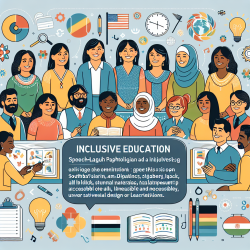Introduction
In the realm of speech-language pathology and child development, data-driven interventions are crucial for achieving positive outcomes. The recent study titled "Supporting Youth and Families in Gaza: A Randomized Controlled Trial of a Family-Based Intervention Program" offers valuable insights for practitioners aiming to enhance their skills and improve family dynamics in conflict-affected areas. This blog explores the key findings of the study and how they can be applied to practice.
Understanding the Study
The study evaluated the Promoting Positive Family Futures (PPFF) program, a brief family-based intervention designed to support family-wide communication and coping in Gaza. The randomized controlled trial involved 68 families, comparing the PPFF intervention with a more extensive, locally established psychosocial support program. The results demonstrated significant improvements in parental depression, emotion regulation, and adolescent adjustment, with medium to large effect sizes.
Key Findings and Implications
- Parental Depression: The PPFF program showed a notable reduction in depression levels among fathers, outperforming the traditional program.
- Emotion Regulation: Both mothers and fathers in the PPFF group exhibited improved emotion regulation using cognitive reappraisal, a critical skill for managing stress and enhancing family dynamics.
- Adolescent Adjustment: Adolescents in both groups showed improvements, but the PPFF program had unique indirect benefits through enhanced maternal emotion regulation.
Practical Applications for Practitioners
For practitioners, these findings underscore the importance of integrating family-based interventions that focus on emotion regulation and cognitive behavioral strategies. By fostering emotional security and communication within families, practitioners can create more resilient family systems capable of navigating adversity.
Implementing similar programs in online therapy settings, such as those offered by TinyEYE, can extend these benefits to a broader audience, providing accessible support to families in need.
Encouraging Further Research
While the study provides promising results, further research is needed to explore the long-term impacts of such interventions and their applicability in diverse contexts. Practitioners are encouraged to engage in ongoing research and collaboration to refine these approaches and contribute to the growing body of evidence supporting family-based interventions.
Conclusion
The PPFF program demonstrates the potential of brief, targeted interventions to significantly improve family dynamics and child outcomes. By adopting evidence-based practices and continuing to explore innovative approaches, practitioners can play a pivotal role in supporting families and fostering positive development in children.
To read the original research paper, please follow this link: Supporting Youth and Families in Gaza: A Randomized Controlled Trial of a Family-Based Intervention Program.










